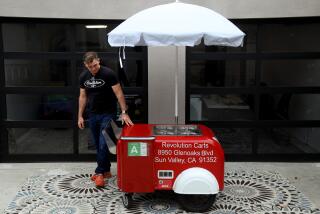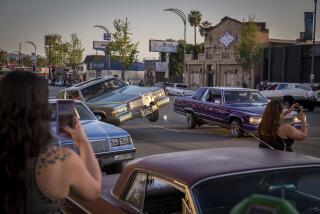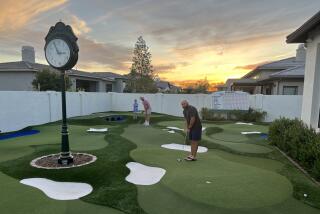Customized Golf Carts Aren’t Just for the Fairway
- Share via
Bob Mills is a Ford man.
His metallic-beige Explorer is parked in the driveway. His brand-new, hunter-green Lincoln and vintage ’32 Roadster are side by side in the garage. But it’s his golf cart--styled like a Mustang--that gets the most use in the gated Indian Wells community where he lives with his wife, Janet.
“We got a Mustang golf cart because he wouldn’t buy me a Mustang car,” said Janet Mills, a 70-something retiree. “He said I have a heavy foot.”
The Millses, whose house abuts the Indian Wells Golf Course, are part of a growing community of retired persons and other individuals buying customized, luxury versions of garden-variety golf carts.
“People are starting to realize that for $3,000 or $4,000 extra, they can get a pretty nice, fancy cart,” said Michael Hruby, owner of Luxury Carts of Hawaii, a 3-year-old dealership on Oahu that sells miniature, electric Hummers, Lamborghinis, Corvettes and Jeeps, to name a few.
“It doesn’t make me play better golf,” said Jeannie Brazil, 59, owner of a ’32 Roadster-style cart with an ooga horn, CD player and ice chest. A year and a half ago, her husband gave her the cart to drive around Catalina Island, which restricts automobiles, so 80% of the residents drive golf carts, 10% of them custom models.
“I love it. It’s really fun,” said Brazil, who is often asked by tourists to pose with her mini-Roadster for photographs. Catalina is a small island and residents all know her cart, so Brazil says she is recognized everywhere she goes.
She may not be distinctive for long. Once a small part of the approximately $600 million-a-year golf-cart industry, custom carts are now the fastest-growing segment of the market, producing 20% to 25% of all sales.
And Robert Enriquez of Ace Golf Cars, a company that represents more than 5,000 golf-cart manufacturers and dealers, projects that custom carts will account for 50% of all cart sales within three years.
At private golf courses, members are increasingly buying their own custom carts. John Kyle, manager of the private Indian Wells Golf Course, said his fleet of 70 standard carts is “getting used less and less” because 70% of the members have bought their own. And at even more elite golf courses, such as Desert Horizons in Indian Wells, a manager said almost all the members have custom carts.
Part of the growth is credited to new U.S. motor vehicle safety standards, issued last year, which allow what are termed Neighborhood Electric Vehicles to be used on public streets with speed limits less than 30 mph. Individual states determine whether to adopt the standards and, unlike most other states, California has adopted them. “We definitely see a market opportunity,” said Glenn Ray, communications manager for Ford’s Think Group, the auto manufacturer’s new electric vehicle division. “When the government developed and approved the new standards, we said, ‘Why not?’ We’d be crazy not to.”
*
Later this year, Ford will begin selling its first electric model, the Neighbor. It also has decided to move the division to Carlsbad, Calif., because the electric-vehicle trend is so strong in the state.
“If somebody has a Taurus and lives in a gated community . . . we’d like to think that instead of jumping in their Taurus and burning gasoline, they’ll jump in a Neighbor, with zero emissions, to run up to the store using [it] as supplemental transportation,” Ray said.
The Neighbor will cost about $6,000, comparable to a brand-new, basic cart by Club Car, E-Z-Go or Yamaha, the three major manufacturers. Luxury carts, however, can run as much as a regular car--up to $20,000.
Southern California and parts of the South have been prime sales territory for cart manufacturers. “There are more golf courses in the Coachella Valley than anywhere else in North America,” said Bryan Mudrak, consumer marketing manager for Atlanta-based Club Car, one of the nation’s largest manufacturers of standard golf carts. Coupling that with the area’s above-average income level, he said, “It makes sense that you’d have a bigger demand for higher-end cars.”
And, as the economy has improved, the desire for custom wheels has grown with it. “In the last decade alone, the wealth in America has improved so significantly that Americans in general, whether it’s an automobile or a golf car . . . nobody’s buying the plain-Jane vehicles,” said Michael Alexander, director of Club Car’s business development.
Custom carts date back to 1974, when Elmco, in Cooksville, Ill., produced an imitation Rolls Royce that came with a television, wet bar, refrigerator, wood-grain dash, chrome-rimmed wheels and a hood ornament. Entertainer Jackie Gleason used one to zip around L.A.
Ralph Gurrola, a golfer who worked at an auto body shop in Palm Desert, is credited with spreading the trend. In 1982, he built his wife a golf-cart replica of her favorite automobile--a ’57 Thunderbird. It was such a hit that he opened Ralph’s Custom Cars and began building other models, including a Mercedes 560 and ’58 Chevy Impala.
The majority of carts that resemble specific models are not licensed through the automobiles’ manufacturers. But that hasn’t stopped more custom golf-cart makers from getting in on the act. Even dealers that previously offered only unadorned carts are now mounting unique bodies onto standard chassis.
Lee Woodyard is president of Ace Motorsports in Ionia, Mich. In addition to selling new and used carts, he builds NASCAR replicas.
“I can’t make ‘em fast enough,” said Woodyard, who lets customers pick the sponsorship stickers and paint jobs affiliated with their favorite drivers. But that’s where the similarities end.
“When you look at it, it says NASCAR . . . but they aren’t fast. They don’t rumble and roar when they go by you. You can’t get hurt in ‘em. They’re golf carts,” said Woodyard, whose carts’ top speed is about 14 mph.
*
Even that may be changing. Some golf carts--mainly those classified as Neighborhood Electric Vehicles--can go more than twice the speed of regular models.
“I wanted to go a little faster,” said Tom Rosby, of Indian Wells, who chose a techno-violet-purple, BMW-style golf cart that goes about 27 mph.
And Mark Leggio’s Hummer-style cart, the Humdinger, can do 40. But it’s too wide to fit on the cart paths and bridges at the Lake Arrowhead Country Club, where he lives and golfs five days a week. So instead of driving directly onto the course from his backyard, he has to use the street.
Still, he said, “I’m having a ball with that thing.”
Leggio, president of the Ontario-based Mark Christopher automobile dealership, bought the Humdinger because “I thought it was the most creative and outrageous-looking golf cart I’d ever seen in my life. . . . When I saw it, I actually started laughing.”
It’s a pretty common response, he said. “Kids love it. [They] look at it like it’s a ride at Disneyland. . . . My wife and I, no matter where we go, someone wants to take a ride in it.”
At the golf course, he said, “I just throw ‘em the keys and tell ‘em to have a good time.”
Humdingers, manufactured by Riverside-based Ultra Custom Carts (a division of the same company that built the longest stretch limo), are one of the most popular golf carts at Rancho Mirage-based Electric Car Distributors, according to its president, J.R. Thomas. When they first became available last October, Thomas had projected sales of about one a month because of their high price--about $17,000. As of May, he had sold 75--some to celebrities, like San Diego Chargers quarterback Ryan Leaf, and golfer John Daly.
“I think it’s because it’s new and different and it kind of exudes power and wealth,” said Thomas.
“We refer to what we build as Big Boy Toys,” said Woodyard. “That’s what these things are. . . . They’re actually a toy for the guy that can afford it.”
More to Read
Sign up for The Wild
We’ll help you find the best places to hike, bike and run, as well as the perfect silent spots for meditation and yoga.
You may occasionally receive promotional content from the Los Angeles Times.






